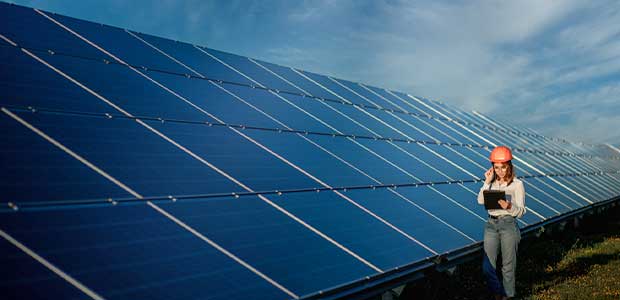Simply Solar Illinois – Tailored Solar Solutions for All Budgets
Simply Solar Illinois – Tailored Solar Solutions for All Budgets
Blog Article
Exactly How Solar Power Can Help You Save Money and Decrease Your Carbon Footprint
The assimilation of solar power right into your energy profile offers a compelling chance for both financial cost savings and environmental stewardship. By using the sunlight's energy, house owners can substantially reduce their month-to-month energy expenses while additionally securing against the changability of future energy costs. The shift to solar adds to a marked decrease in carbon discharges, straightening individual money with broader environmental goals. As various federal government motivations become readily available, the inquiry arises: how can one successfully browse the preliminary investments and continuous benefits of solar innovation to make the most of both economic and environmental gains?
Recognizing Solar Energy Financial Savings
While the transition to solar energy often entails an initial investment, understanding solar power cost savings is vital for property owners and companies alike. Solar energy systems can considerably reduce electrical energy bills by taking advantage of the sun's power, equating into considerable long-term economic benefits.
Furthermore, solar power systems might receive different financial incentives, consisting of tax debts and discounts, additionally enhancing their cost-effectiveness. The availability of internet metering allows users to offer excess energy back to the grid, developing an extra income stream. These variables add to the general cost savings connected with solar power.

Along with guide financial cost savings, solar energy uses the included benefit of enhancing residential property worth. Residences equipped with photovoltaic panels are frequently more appealing to purchasers, as they guarantee lower power prices - Simply Solar Illinois. Recognizing these elements is important for any person thinking about solar power, as it highlights not just the potential financial gains, but additionally the more comprehensive ecological and economic benefits of embracing renewable resource services
First Costs vs. Long-Term Conveniences
When assessing solar power, it is necessary to evaluate the first costs versus the lasting benefits. The upfront financial investment for solar panels, installation, and associated equipment can be considerable, typically ranging from $15,000 to $30,000, relying on the system dimension and home energy needs. This initial expenditure may deter some house owners; however, it is crucial to consider the possible savings over time.
Once installed, solar power systems can dramatically decrease or perhaps eliminate monthly electrical energy bills, bring about substantial long-term monetary advantages. Studies suggest that property owners can save anywhere from $10,000 to $30,000 over the life-span of their solar system, commonly 25 years. Additionally, many states offer rewards, tax obligation credit scores, and discounts that can offset preliminary costs, making solar much more available.

Lowering Your Carbon Impact
Minimizing your carbon impact is a critical consideration in today's environmentally aware society, and adopting solar More Help energy is among one of the most effective strategies to achieve this objective. Solar energy is a clean, renewable energy that considerably decreases dependence on nonrenewable fuel sources, which are major contributors to greenhouse gas discharges.

In addition, the extensive fostering of solar modern technology encourages the advancement of environment-friendly jobs and supports technologies in power storage space and performance. The even more individuals and companies buy solar power, the greater the collective reduction in carbon exhausts, fostering a cleaner atmosphere for future generations.
Government Motivations and Rebates
Taking on solar power not just benefits the atmosphere however can likewise bring about substantial monetary savings, specifically with the availability of government motivations and refunds. Numerous federal, state, and regional programs are created to encourage homeowners and companies to purchase solar power systems, making the change more inexpensive.
Among the most prominent incentives is the Federal Financial Investment Tax Obligation Debt (ITC), which enables solar system proprietors to subtract a considerable portion of the setup costs from their government tax obligations. This incentive has been critical in reducing the in advance costs related to solar power systems. In addition, lots of states offer their own tax credit ratings, grants, and rebates that can even more boost financial savings.
In addition, some city governments supply real estate tax exceptions for solar installments, ensuring that property owners do not deal with enhanced home taxes as a result of their renewable resource financial investments. Energy business may also provide motivations, including web metering and feed-in tariffs, which permit solar power individuals to market excess power back to the grid.
Picking the Right Solar System
Choosing the ideal solar system is essential for making best use of power effectiveness and monetary advantages. The choice hinges on a number of aspects, look at these guys consisting of energy needs, budget Your Domain Name plan, and available space. Home owners need to begin by evaluating their power intake to figure out the system dimension required for optimal performance.
Following, think about the different kinds of solar modern technologies available. Simply Solar Illinois. Photovoltaic (PV) panels are the most usual, converting sunlight straight right into electrical power, while solar thermal systems concentrate on heating water. Each kind has distinct advantages depending on individual demands
Budget considerations are additionally vital. First setup expenses can vary substantially, so it is essential to contrast quotes from several providers and check out funding choices. Government rewards and refunds can better lower the monetary burden, making solar systems more available.
Verdict
In recap, solar energy provides a feasible remedy for achieving considerable price savings while at the same time lessening carbon exhausts. The first financial investment, though considerable, returns significant long-lasting financial advantages, with possible financial savings varying from $10,000 to $30,000 over 25 years. The environmental benefits of solar power contribute to sustainable techniques vital for combating climate adjustment. Federal government incentives improve the expediency of solar modern technology fostering, motivating a change towards a cleaner, a lot more economically reliable power resource.
Report this page